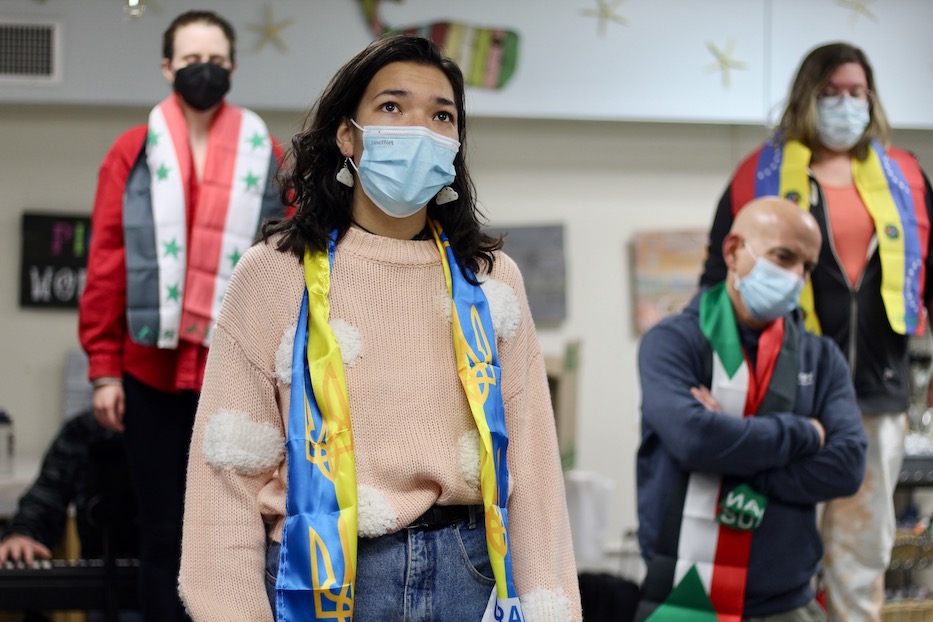
Bregamos Community Theater | Culture & Community | Arts & Culture | Musical Theater | New Haven | West Haven | FUSE Theatre of CT
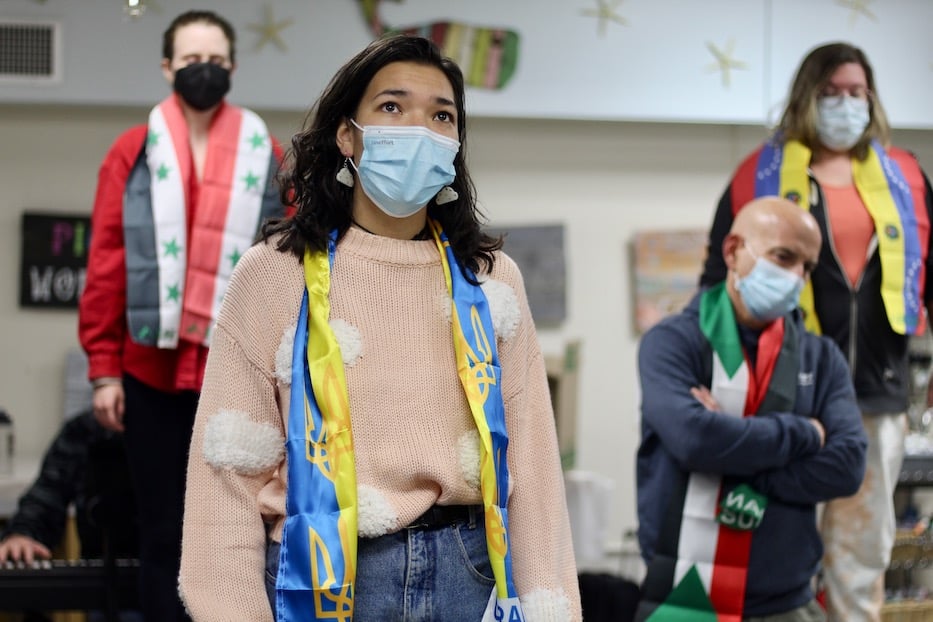
Tiessa Hills carries the vocals for "On The Deck of a Spanish Sailing Ship." FUSE's performance of Songs for a New World runs at Bregamos Community Theatre, 491 Blatchley Ave. in New Haven, on Friday, January 6 at 7:30 p.m., Saturday, January 7 at 3:00 p.m., Saturday January 14 at 7:30 p.m., and Sunday, January 15 at 3:00 p.m. Lucy Gellman Photos.
Note: Due to illness, performances were rescheduled to January 2023. They will take place Friday, January 6 at 7:30 p.m., Saturday, January 7 at 3:00 p.m., Saturday January 14 at 7:30 p.m., and Sunday, January 15 at 3:00 p.m.
Tiessa Hills was standing on a precipice, ready to step into the unknown. Around her, the bow and sides of a tall ship materialized lyric by lyric, as if the words were building each plank.
I'm begging You, Lord/You gotta stop! Take a look!/At your children who believe in this promised land! she sang. Cast members swayed, rocking in place. A light flickered overhead, and suddenly it too was braving the high winds and stormy seas. And yet, at the end of the song, everyone was still standing.
A sense of knitted, certain community suffuses Songs for a New World, running from FUSE Theatre of CT this Friday through Sunday night at Bregamos Community Theater. Written by Jason Robert Brown and directed by writer, video editor and producer Noah Golden, the performance turns the show into an opportunity for narrative and commentary, transporting characters from the 1990s straight into the present day. It marks Golden’s directorial debut.
Performances run at Bregamos Community Theatre, 491 Blatchley Ave. in New Haven, on January 6 at 7:30 p.m., January 7 at 3:00 p.m., January 14 at 7:30 p.m., and Sunday, January 15 at 3 p.m. Tickets are $22; more information is available here.
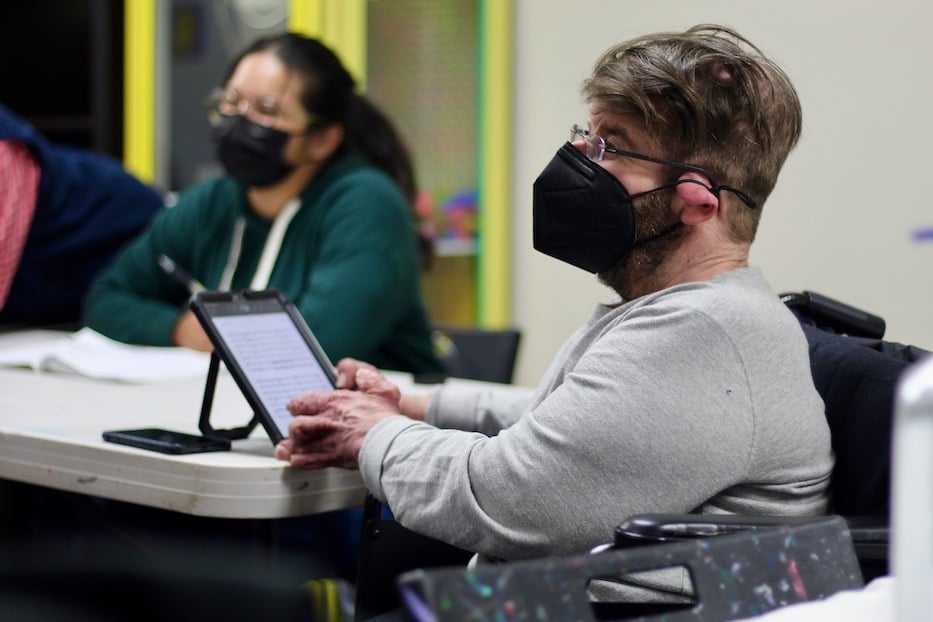
Golden at a rehearsal in West Haven on Sunday night. He said he is excited to perform at Bregamos, which has been on his radar "forever," and said that working with Founder Rafael Ramos has been a lovely experience. Lucy Gellman Photos.
“The biggest challenge of this show is how do you make it feel like a show and not a concert?,” said Golden at a rehearsal Sunday night, as cast members turned Picasso Parties’ West Haven storefront into a stage. “Part of that is by having multiple people on stage. And then part of it is connecting the songs. I think the organic goal has been: ‘Here’s the intent, here’s the story.’”
Written in the 1990s, the musical revolves around the idea of being on a precipice, and making the decision to step into the unknown. While some of the pieces have historical context baked in (“The Flagmaker, 1775”), most are more open-ended, set on street corners, nameless and often abstracted battlefields, in characters’ imaginations. It makes for more of a 15-song cycle, tenuously tied together with an earwormy score and some notion of a “new world” (spoiler: It’s America. Or is it?).
It is a show steeped in memory, which feels right for how young Brown was when he wrote it. When it first made its debut at the now-shuttered WPA Theatre in 1995, Brown was just 25, standing on the cusp of adulthood with a half-finished music degree and the beginning of a still-evolving musical career. His Tony-winning music for Parade and work on The Last Five Years, which would debut three and six years later respectively, were still on the horizon. The show—maligned by some critics, and beloved by many—put him on the map.
On Golden’s watch, it becomes a narrative, in which the American flag is an inflection point, source of inquiry and unspoken character. From the first moments of the show—just Music Director Aron J. Smith and actor Amber Emerson onstage, sounding out the first few notes on the piano—a large flag waits quietly in the wings. Throughout the performance, actors weave story around it—the flag held up in billowy red, white and blues, the same flag folded neatly and given to a bereaved parent with a clean military salute; the flag soaked in patriotic nostalgia.
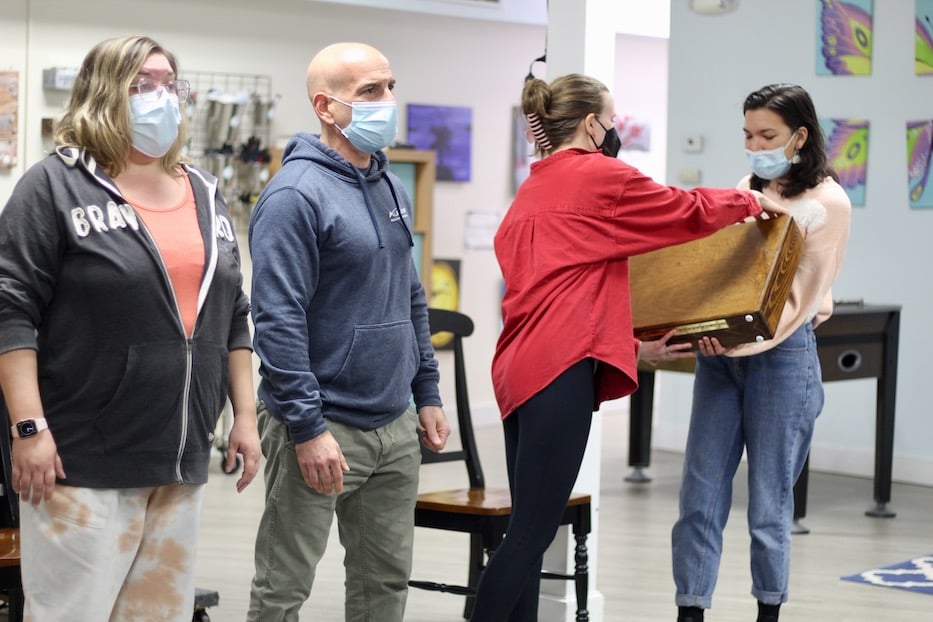
Kelsey Mulligan, Brian Meltzer, Amber Emerson and Tiessa Hills. Lucy Gellman Photos.
What makes it so very much worth watching is that Golden and the cast lean all the way into the present, interested in how the show resonates now. When the work premiered in 1995, Brown could not have seen into the future—to the start of America’s longest war, to the rise of “smart” technology and ensuing loss of human connection, to the long-awaited toppling of Confederate statues in the South and the Republican backlash that followed, to a reckoning with history that is still very much ongoing.
Golden is fascinated by that space in between, and his choices give the audience new eyes to see the work. On paper, Songs for a New World hasn’t aged particularly well: characters fall along fairly gendered lines, its brushes with poverty (“The River Won’t Flow”) and the carceral state (“King Of The World”) feel cursory and at times questionable, and songs like “Steam Train '' read as fertile ground for appropriation, respectability politics, and schmaltzy choreography.
And yet, the score is infectious, jumping from jazz to pop to rock to classical. So Golden pushes back, probing the decades that have passed to see what he can pull out. In doing so, he finds a balance of urgency and hope that feels right on time.
In “On The Deck Of A Spanish Sailing Ship” (originally titled “On The Deck of A Spanish Sailing Ship, 1492”), for instance, he dresses actors in stoles with the flags of Haiti, Afghanistan, Syria, Venezuela and Ukraine as they take the stage. As Hills begins to sing, their bodies are balanced precariously on chairs and suitcases. It is no longer 1492 but 2022, and these are refugees, in search of a place that will take them in.
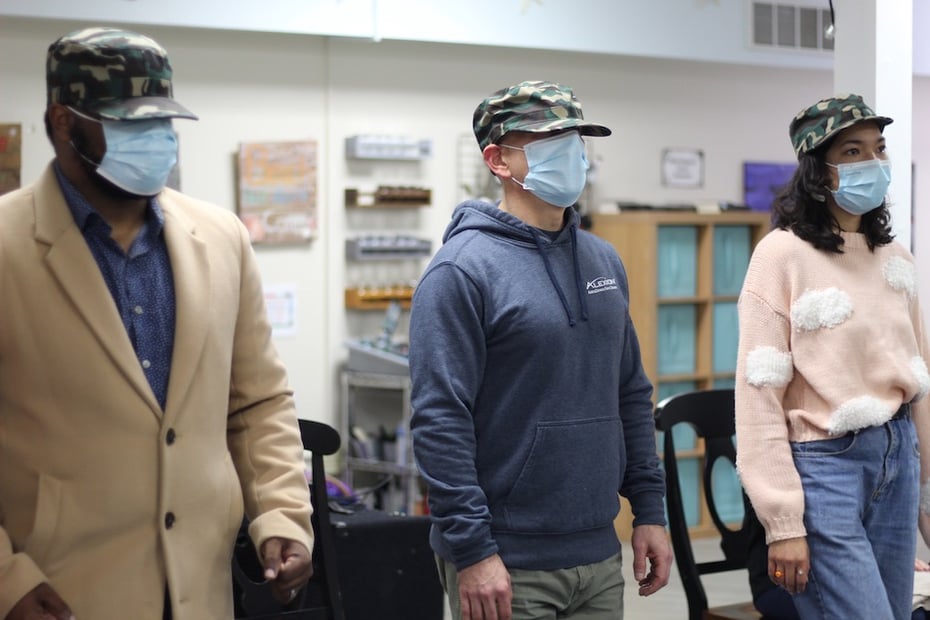
Ty Scurry, Brian Meltzer, and Tiessa Hills. Lucy Gellman Photos.
Hills, who moved to Connecticut from Nebraska a year and a half ago, has the song on lock: her voice soars over, under, and through harmonies that her fellow actors weave around her. As the final notes of the song ring out over the audience, an American flag appears, suspended between cast members’ hands.
In the audience, the image is as effective as it is affecting: one’s mind cannot not go to the images of Haitians whipped at the U.S.-Mexico border; to the disastrous withdrawal of American troops from Afghanistan and abandonment of Afghans who risked their life for the promise of America; to busloads of Venezuelan migrants sent across the country with no context and no resources in a political stunt. In other words, the flag is a question mark, and not a period. It is itself a precipice.
So too in “Flying Home,” to which the simple addition of basic choreography and low-pulled camouflage caps tell a whole story, and become an emotional indictment of the military industrial complex in the process. As Ty Scurry begins to sing—The angels called you/To leave this la-aa-nd—he transports a listener to another universe, not this world and not not this world either.
As five voices rise around him, cast members begin to move, each telling a part of the story. It is difficult to listen without feeling that rock in your gut—the one that comes from the sheer cost of state violence, from the weight of death, from the reality of young people sent off to fight wars that they did not start, and may not survive.
The song has a legacy of big shoes to fill, from Billy Porter to Ty Taylor to Mykal Kilgore, and yet Scurry adds something that is his own. There is an edge to his voice that is sharp but tender and sweet, young and wise beyond his years, powerful and also aware of its power. At just 20, he knows exactly when to vocally step forward and when to pull back, how to tell an entire story in the contours of his voice.
In many ways, the way the cast works in the song a mirror for the larger work. While the original book is written for a cast of four actors, this production includes six, a hodge-podge of Connecticut community theater veterans (Susan Kulp, Kelsey Mulligan), new transplants with rafter-raising vocals (Tiessa Hills, Amber Emerson), educators who have been out of the spotlight (Scurry, as well as Smith on keys) and newbies (Brian Meltzer) who take the score in stride. At its best, it means that Songs for a New World brims with an optimism that feels itself like an act of resistance.
“It's such good music,” Golden said. “We've been listening to this music non-stop since August and we're not sick of it. It's so beautiful and complex, and well-written … It can highlight what we can do really well, which is get really talented performers in a room together and have them share these songs and stories.”
That sense of cohesion wove through every aspect of rehearsal Sunday night, from warmups to the final walk-through of the space. As night fell over Ocean Avenue outside, cast members ran through pieces around a keyboard, Smith’s tie-dye mask peeking out as they rotated through songs. From the first notes of “The World Was Dancing,” Meltzer’s voice swooped in, floating over every square inch of the space. Then it was Emerson’s turn, and a burst of sound rose into the air, nearly prayer-like.
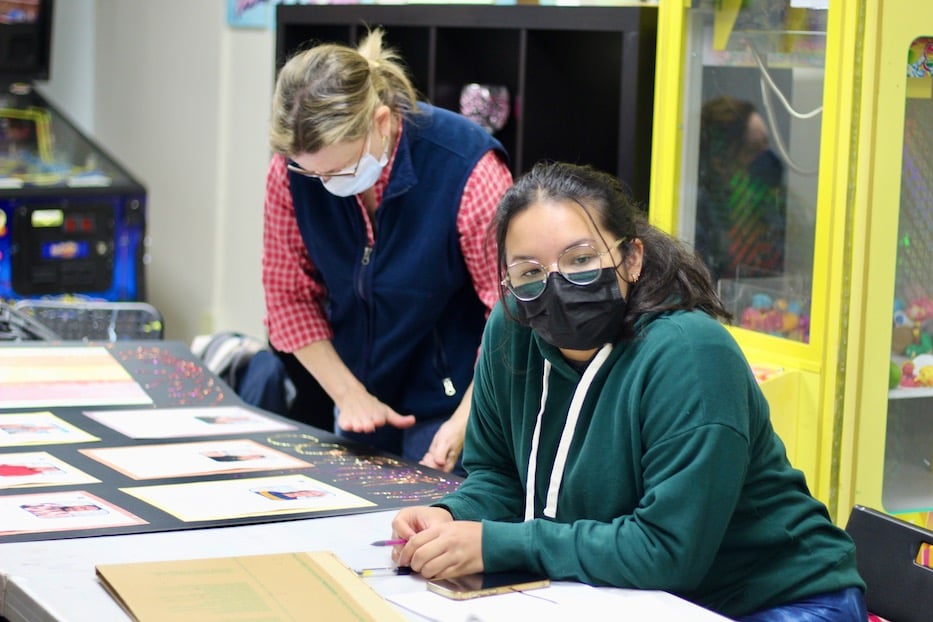
Stage Manager Camille Fortin, a lifelong New Havener who graduated from UConn with a BFA in acting and a BA in communications. "They've been a joy to work with," she said of the cast. "There have been no 'nos,' and all 'yeses.' Watching them work has been so gratifying." Lucy Gellman Photos.
Around them, the signs of a community production were everywhere. A display of frosted trees and snowflakes stood ready beside two bright, festive canvases, a reminder that the space was only theirs temporarily. Dozens of brushes, still caked in blue and purple paint, sat to the side in mason jars. As stage manager Camille Fortin followed along, ready to jump in, Elizabeth Santaus sprinkled pink and gold glitter onto a sign with cast members’ names and headshots, creating fireworks that gleamed beneath the light.
Then, Golden was all business. No sooner had Susan Kulp started in on “The Flagmaker, 1775” than he paused the song, mulling over its intentions with Kulp. Moments later in “Flying Home,” he tweaked the choreography, raising his arms in a suggestion that the cast took right on. Before the end of the night, he was debating the merits of running over “The River Won’t Flow” or “Steam Train,” ultimately deferring to cast members.
During rehearsal breaks, several cast members said they are grateful to be part of the show—and are constantly learning from both the score, Golden’s direction, and each other. For many of them, it marks their first piece of musical theater since fall and winter 2019, just before the Covid-19 pandemic arrived in New Haven.
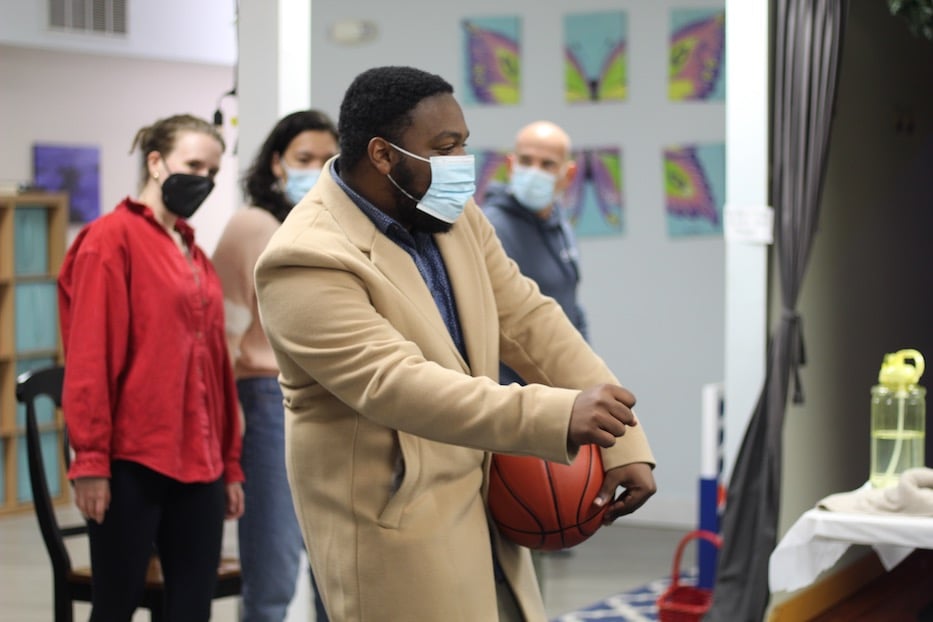
Ty Scurry solos in "The Steam Train." Lucy Gellman Photos.
That’s true for Scurry, who last played Benny in Square Foot Theatre’s 2019 production of In The Heights. After hearing about Songs from FUSE Co-Founder Lara Morton, he originally passed on the show, insisting he didn’t have time (outside of rehearsals, he runs the Academic Theatre Company at James Hillhouse High School and is very active in his church). When Morton and Golden asked a second time, he jumped onboard. Months later, he said he’s so glad that he did.
“Oh my goodness! I’ve learned that I can hit notes I didn’t know I could hit!” he said with a laugh. “This show is really about being a member of a community. It teaches you that you can leave home, but there’s really nowhere like it.”
“This show pulls on my heartstrings a lot more than other shows,” he added. “It’s such a powerful show to tap into your emotions.”
Emerson, who recently moved to Connecticut from New York, said she’s wanted to do the show for years. After falling in love with theater as a kid in central Pennsylvania, she pursued acting as her professional career. She spotted a casting call for FUSE on Instagram.
“It’s great,” she said. “It was fun to jump into this theater, because it’s community theater and everyone really wants to be here and really puts their heart into it.”
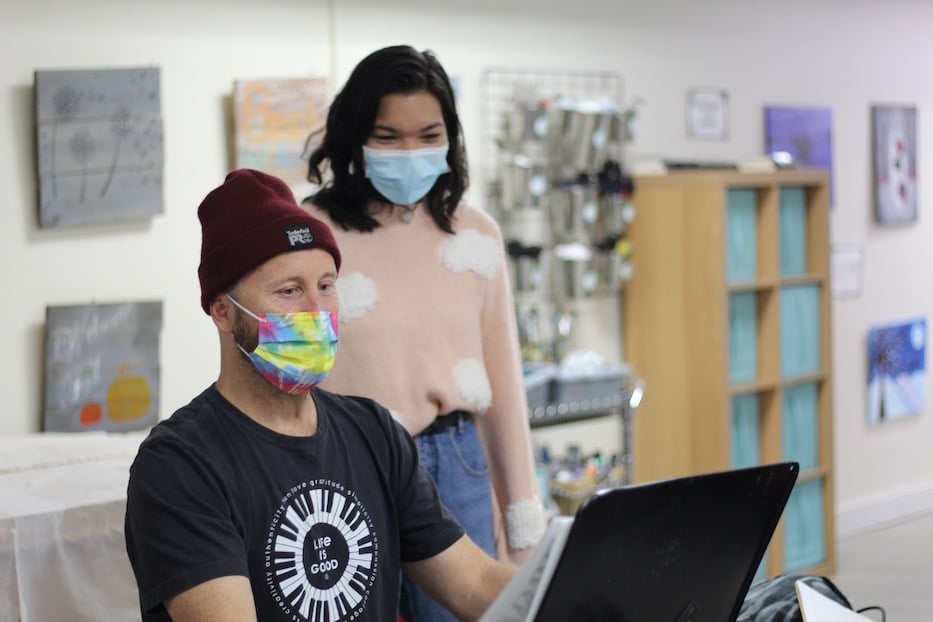
Music Director Aron J. Smith and Hills. Lucy Gellman Photos.
Her words echoed across the space as cast members began a run-through, knowing they wouldn’t have time to finish it before their 9 p.m. stop. There’s something about this moment—this moment, in Connecticut, in an unseasonably warm and wet fall, just a week after the 2022 midterms and almost three years into a pandemic—to which the music feels surprisingly and inextricably tied.
In the face of massive uncertainty, the songs in Songs remind an audience that there are still babies being born. That the stars still come out every night. That refugees will continue to arrive on Connecticut soil. That to the heavy of living, there is still life to be lived, and what a life it may be.
FUSE rises to meet it. After the lights come down, members of the audience are left to decide: Will you open the door to this new world? Or will you stay back, for the one you already thought you knew?
FUSE Theatre of CT’s Songs for a New World runs at Bregamos Community Theatre, 491 Blatchley Ave. in New Haven, on January 6 at 7:30 p.m., January 7 at 3:00 p.m., January 14 at 7:30 p.m., and Sunday, January 15 at 3 p.m.. Tickets are $22; more information is available here.

